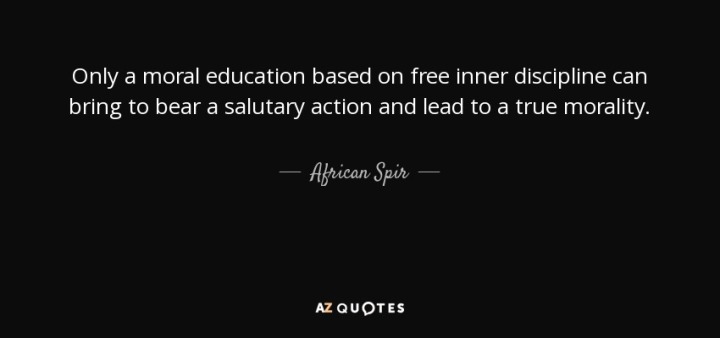Morality Based Education
Before the commencement of 20th century, the role of education was to inculcate moral and religious values. Since the dawn of the industrial era and particularly after the Second World War, education became more career oriented. Its value as a job grabber and a mode for competition for industrial and corporate positions has increased tremendously. Gradually the process of providing values and morals, both worldly and religious, moved to the end of the list of objectives of education.
Another problem with moral education is that it cannot be taught directly in the form of a sermon. When it is provided in the form of a sermon, as we usually see in the religious dogma, it produces fear and may convince the receivers to hide and sneak in their immoral behaviors, but it does not create an impact that is capable of convincing the receivers about its everlasting worthiness and its impact on their personal lives. Morality is like the koan of Zen. The Bodhisattva comprehends the answer of the riddle (koan) when he reaches the stage where the spiritual dilemma connected to the koan appears in his consciousness as a reality of the cosmos, a point where he has no doubts about the validity of the spiritual fact represented in the koan. Morality that is structured as a hidden curriculum at different levels of the education of a student brings more concrete change in character than the morality that is provided in black-and-white terms of good and bad in the fear-mongering sermons of organized religions, or in the speeches of political leaders who pawn religion to gain political advantage.

Sidney Hook writes in John Dewey: Moral Principles in Education, “The much lamented separation in the schools of intellectual and moral training, of acquiring information and growing in character, is simply one expression of the failure to conceive and construct the school as a social institution…” Was school ever a social institution? When did it stop being a social institution? And why? In the late 1920’s, the movement of Dada appeared in the art world. It emerged from the disillusionment in religion and, up to a certain limit, in God, who was incapable of stopping atrocities that humans inflicted upon each other during the First World War. It also arose from the disappointment in the morality of overall humanity that was unable to see the fatality of its deeds. For them, the present moment was the time that was the most precious in human life. There was nothing beyond this material world and there was no other reality beyond the reality they were in. The Dada manifesto says, “I have given a pretty faithful version of progress, law, morality and all other fine qualities that various highly intelligent men have discussed in so many books, only to conclude that after all everyone dances to his own personal boomboom, and that the writer is entitled to his boomboom: the satisfaction of pathological curiosity…” It further implores us to “respect all individuals in their folly of the moment: whether it be serious, fearful, timid, ardent, vigorous, determined, enthusiastic.” At the same time, the emergence of psychology as a science of life implied that God’s existence was in question and human personality and morality is the result of the incidents and actions impinged in the subconscious. It facilitated the tendency to take refuge in the material present. These movements were not only in art and science but they also appeared in the social lives of people. On the one hand, the United Nations and human rights appeared so that humans would not reach the point where they would treat each other in the undignified manner as they did in the First and Second World Wars, and on the other hand, trust in human morality and healing power deteriorated. Education is not isolated from the society in which it is imparted; therefore, the moral aspect of education fell far behind in the priorities of teaching.
In the last century, humanity has witnessed vast colonization of Asia and Africa for material gains. After independence, many nations fought costly wars on disputes over land and resources, genocide in Africa appeared in one or the other country every few years, and military and corrupt governments in Asia and Latin America deposited their hordes of money in the banks of Switzerland. At the dawn of twenty-first century, when we are about to kill the earth by pollution, over-population, and plastic bags, and struggling to create consensus on implementing strong regulations on carbon emission, we have to ask what kind of education is important for the future generations? An education that prepares its students to fight in the corporate arena to grab CEO positions in order to squeeze more money out of the system, or an education that provides a moral ground to construct one’s life and career, and to be an active participant in building a just society? A few moral men could stop the insane ambitiousness of Alexander the Great (not so great from my point of view) and could stop the chaos in the world; a few moral men could have resisted Hitler and make him rethink his attitude towards humanity and possibly stop the Second World War. And a few more human rights activists may pave the path to end the siege of Palestinian lives, and stop the futile wars in different parts of the world. Do we need more such moral people or do we need people who are only hungry for power and money? Education today has to make its choice. This may seem to be a huge burden on a poor system of education, but this burden is much less than the burden we will face in the future if we fail to make the right choices.
 |
| Entangled Lives |


Comments
Post a Comment